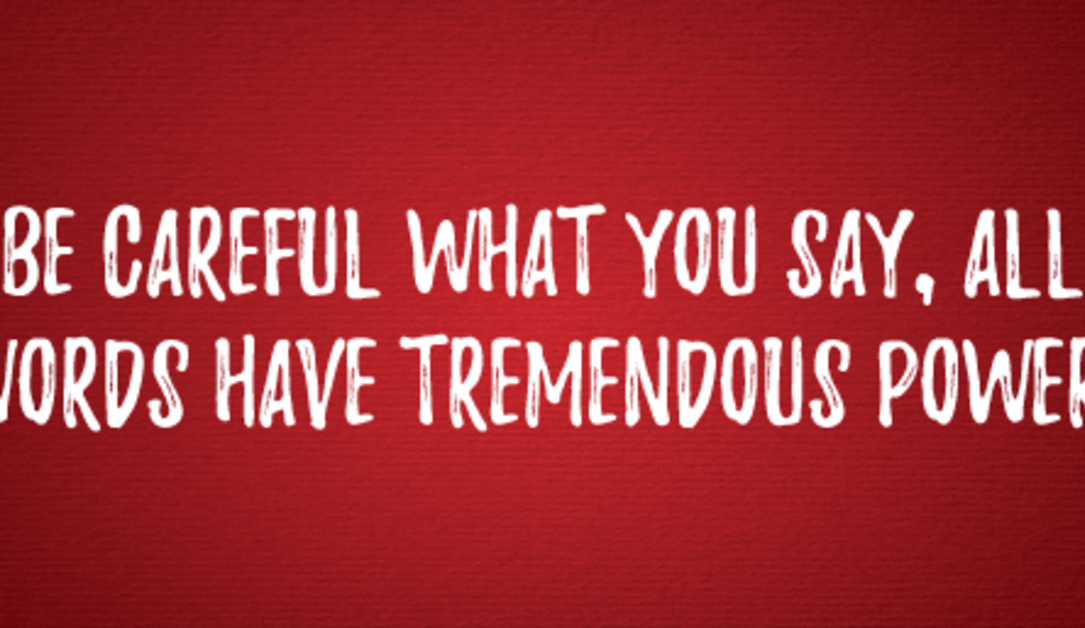There is wisdom about the impact of words written in the book of James. The passage reads,
“When we put bits into the mouths of horses to make them obey us, we can turn the whole animal. Or take ships as an example. Although they are so large and are driven by strong winds, they are steered by a very small rudder wherever the pilot wants to go. Likewise the tongue is a small part of the body, but it makes great boasts. Consider what a great forest is set on fire by a small spark. The tongue also is a fire, a world of evil among the parts of the body. It corrupts the whole person, sets the whole course of his life on fire, and is itself set on fire by hell.”James 3:3–6
Have you ever set yourself or others on fire with sparks spraying from your tongue? More important, have you ever set a child’s spirit on fire with anger? All of us have made that costly mistake. We knew we had blundered the moment the comment flew out of our mouths, but it was too late. If we tried for a hundred years, we couldn’t take back a single remark. The first year Shirley and I were married, she became very angry with me about something that neither of us can recall. In the frustration of the moment she said, “If this is marriage, I don’t want any part of it.” She didn’t mean it and regretted her words almost immediately. An hour later we had reconciled and for- given each other, but Shirley’s statement could not be taken back. We’ve laughed about it through the years and the issue is inconsequential today. Still, there is nothing either of us can do to erase the utterance of the moment.
Words are not only remembered for a lifetime, but if not forgiven, they endure beyond the chilly waters of death. We read in Matthew 12:36,
“But I tell you that everyone will have to give account on the day of judgment for every empty word they have spoken.”
Thank God, those of us who have a personal relationship with Jesus Christ are promised that our sins—and our harsh words—will be remembered against us no more and will be removed “as far as the east is from the west” (Ps. 103:12a). Apart from that atonement, however, our words will follow us forever.
I didn’t intend to preach a sermon here, but I find great inspiration for all family relationships within the great wisdom of the Scriptures. And so it is with the impact of what we say. The scary thing for us parents is that we never know when the mental videotape is running during our interactions with children and teens. A spontaneous critical comment that means little to us at the time may “stick” and be repeated long after we are dead and gone. By contrast, the warm and affirming things we say about our sons and daughters may be a source of satisfaction for decades. Again, it is all in the power of words.
The circumstances that precipitate a hurtful comment for a child or teen are irrelevant to their impact. Let me explain. Even though a child pushes you to the limit, frustrating and angering you to the point of exasperation, you will nevertheless pay a price for overreacting. Let’s suppose you lose your poise and shout, “I can’t stand you! I wish you belonged to someone else.” Or, “I can’t believe you failed another test. How could a son of mine be so stupid!” Even if every normal parent would also have been agitated in the same situation, your child will not focus on his misbehavior in the future. He is likely to forget what he did to cause your outburst. But he will recall the day that you said you didn’t want him or that he was stupid. It isn’t fair, but neither is life.
I know I’m stirring a measure of guilt into the mix with these comments. (My words are powerful, too, aren’t they?) My purpose, however, is not to hurt you but to make you mindful that everything you say has lasting meaning for a child. He may forgive you later for “setting the fire,” but how much better it would have been to have stayed cool. You can learn to do that with prayer and practice.
I’ve strayed a bit from my theme of relationships, but I think the discussion of words was important. Returning to the issue at hand, the day is coming when those of you with young children will need to draw on the foundation of love and caring that you have built. If resentment and rejection characterized the early years, the adolescent experience might be a nightmare. The best way to avoid this teenage time bomb is to defuse it in childhood. That is done with a healthy balance of authority and love at home. Begin now to build a relationship that will see you through the storms of adolescence.
From Dr. Dobson’s book Your Legacy: The Greatest Gift. Request this resource HERE.












